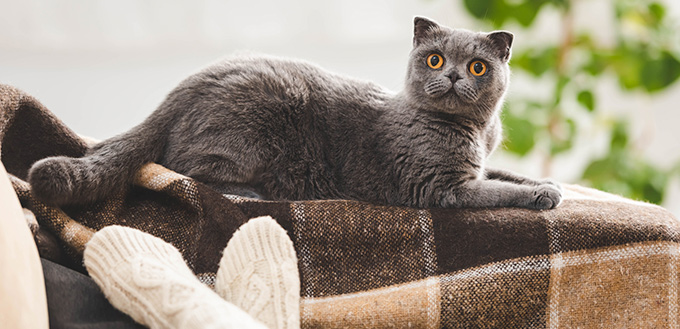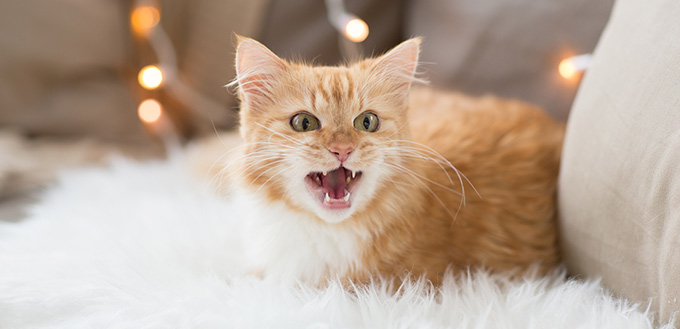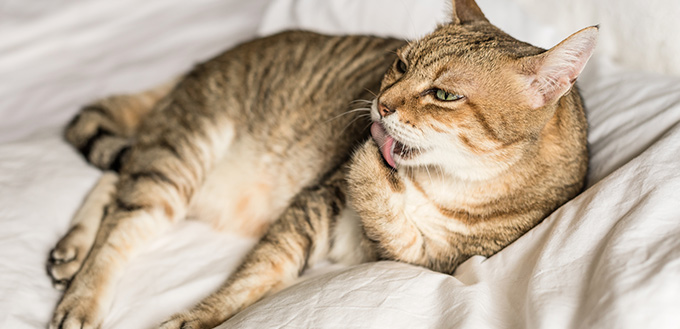Cats have always been seen as aloof and independent in the extreme. For this reason, some people prefer them to dogs who are seen as the clingier of the two. Interestingly enough, there have been more and more instances of clingy cat syndrome, which will naturally worry a pet owner. It could also be challenging to differentiate between a friendly cat and a clingy one. So, in this piece, we will be looking at some of the symptoms that show if you have a clingy cat.

Why is my Cat Clingy?
If you are a cat owner that regularly asks ’’why is my cat so needy?’’ it might interest you to know that, for the most part, clingy cats usually fall into three broad categories that include orphaned cats, cats weaned too early, and cats separated from their mates too quickly.
To avoid this, cats should be weaned slowly and also kept with their littermates for as long as possible. You can also spruce up your apartment with more toys and items to make your cat feel more comfortable. So, how do you know your cat is clingy? The following ways will help you identify.
The Stalker
Have you noticed that when you get up, your cat also mimics this and follows you? Have you gone to the bathroom and had your cat meowing outside the door (or in some instances, just barge in)? This could point to your cat being of the clingy nature. These cats are typically called ‘the follower,’ and they stalk your every move. You should watch out for this behavior as it usually means a clingy cat.
Refusal to Eat
You might have poured some food for your cat before leaving for work only to come back and see that it has eaten very little/not at all. Or that your cat doesn’t eat until you start to feed it manually. This is, of course, very worrying as your first instinct would be that your little furry feline is ill. That could be the case; however, sometimes, it’s just that your pet is overly needy. This sort of behavior is brought on by separation and comes about because your cat doesn’t feel safe enough to eat when you are not around. If this is the case, then you might have yourself an overly affectionate cat.
Territoriality
Cats are naturally territorial. They mark their humans by grooming them, and they rub themselves against objects and pieces of furniture to ‘own it.’ This is usually viewed as a cute quirk, but it could also be a sign of your cat being clingy. You may notice that your cat loves sleeping next to you in bed, or really enjoys snuggling. This, in itself, is not a problem, and it is enjoyable when they do that, especially when the nights get cold. Their bodies are warm, and there’s something about feeling the warmth of life against you while you sleep.
This behavior could get out of hand, though, and you should be wary if your cat starts trying to take up vast swathes of the bed or the pillow. You might find yourself cramped in a tiny corner of the bed with the feline taking up the rest of the bed. This could also be a case of an overly needy cat.
Excessive Meowing
We all love our cats, but even the staunchest cat lover can get a little irritated when it starts to meow excessively. This is particularly annoying when you’re trying to get some sleep. Cats meow for several reasons. Sometimes, it’s a cry for food; other times, it’s a plea for attention and petting. There are even times where it’s for nothing at all, and they just feel like saying hello. But you should take note if you notice that your cat meows a lot when you are not home.
You can imagine that finding out about this might also mean that you have a couple of problems with the neighbors who are displeased with all the noise. Separation anxiety sometimes causes cats to meow loudly and excessively. They miss you and want you home. While this is a sweet sentiment, it could also become a problem down the line.

Manipulation
Surprise, surprise! So cats can be manipulative? Who’d have thought? I kid, I kid, we all know that cats can be pretty manipulative, it’s just who they are. This is a massive problem with clingy cats who would now do anything for attention. Cats are alert to how we treat them, and many are wise to the fact that cat lovers can go a bit overboard with love.
This then leads them to become increasingly manipulative, which leads them to do things that they know will get them some petting. This could be meowing, following you about, or rubbing themselves against you and then laying down with an air of expectation. They know you will indulge them, and this could be a problem. Manipulation can be termed as clingy cat behavior and should be avoided as much as possible
Avoiding Strangers
Just like humans, cats have different attitudes towards strangers. Some are friendly and would go sniffing to see who they’re dealing with; others will act aloof and act like the person doesn’t exist (this could hurt.) There are times, though, that your cat freaks out and attaches itself to your legs. If you notice that your cat is suddenly clingy when strangers come around and follow you everywhere during this period, it could be a sign of a super needy cat.
Typically, cats are independent and confident. This usually shines through when they are around people they don’t know, as long as it is on their home turf. So, clinging to you over the fact that there’s a stranger in the house is definitely a red flag and should be looked into.
Controlling Where You Sit
As mentioned before, cats are pretty territorial. Most cat owners and lovers admit that, for the most part, the cat is the master, and we are just servants catering to their every need. But, there are times they take this to the extreme and become tyrants and dictators. This usually happens when they begin to control where we sit, stand, sleep, and so on. Cats are creatures of habit and are used to their humans doing certain things and being in certain places. Of course, as humans, we sometimes want to try something different. So we sleep on a different section of the bed or sit on a different chair in the living room. Usually, cats can roll with this, and they have no qualms with such behavior, but overly clingy cats act differently. Does your cat get agitated whenever you make a small lifestyle change? If the answer to that is yes, then your cat might be a needy one.
Repeated Scratching
You won’t always have time for your cat. There are times you’ll look to have some ‘me’ time. This might translate to watching some TV, getting some sleep, reading a book, playing video games, etc. Clingy cats won’t stand for this, and you might notice that your cat locks eyes with you all the time or comes towards you to scratch you on the cheek, nose, or forehead. This could all point to your cat being a clingy one.
Overgrooming
Cats are bastions of cleanliness (as far as an animal can be anyway). So they cover up their poop, they lick themselves to keep clean and generally don’t indulge in a rough and tumble lifestyle that a dog might. However, just like everything in life, too much of anything is bad. You may notice your cat regularly grooming itself, whether in a corner or while lying on the floor. Such behavior could mean that the cat is too clingy.
This could also manifest if they need to be petted constantly. A cat’s purr while enjoying a delightful petting session is a thing of beauty. But, they could also become addicted to this and demand it all the time. Cats would typically not do this and even sometimes get feisty when they are petted too much. So if your cat is always seeking to be cuddled and petted, you may have a problem on your hands.

Naughty Behavior
Generally speaking, cats are usually well-behaved creatures. They explore, sniff everywhere, and generally play it safe. But sometimes you’ll come home and find that your cat has peed where it shouldn’t have, or has decided to chew on things it shouldn’t. This is, of course, naughty behavior, and it shouldn’t be tolerated. However, it could also be a sign of separation anxiety. You’ll notice that the cat doesn’t do this when the owner is home and only indulges in this sort of behavior in the owner’s absence. Cats like this could be said to be overly clingy.
Conclusion
Clinginess in cats could be lessened or controlled with more toys and cat-friendly items for your pet to interact with. However, if the situation is critical, it might need to be addressed by a cat psychologist. Always make sure you know the emotional state of your cat and try to provide your pet with everything it needs in moderation.
Source:
- Amy M. Armstrong, Can Kittens Become Too Attached to Humans?, The Nest






